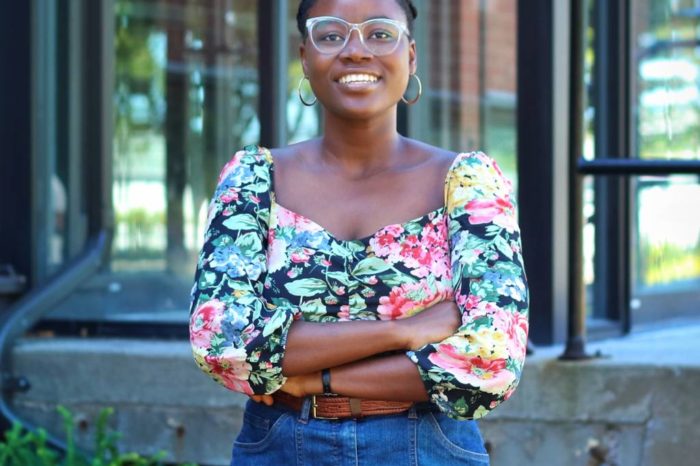Sex work is real work: an interview with an online sex worker
By: Chelsea Perry

It felt like a rush to post photos of myself in a bra and underwear on Instagram and see immediate positive reactions. (Get Your Guide)
Let’s have an honest chat about sex work.
How many times have you, in the throes of midterms, ever made the statement, “screw this, I’ll just be a stripper� How many of you would actually follow through with that? Probably not a lot.
Sex work, in our society, is drowning in stigma. It is one of the most maligned forms of labor, and often subject to misrepresentation and discrimination in the court of law.
“Do they even respect themselves?â€
“They must not be able to get another job.â€
“I could never sell my body like that.â€
“You can’t support sex workers while disagreeing with sex trafficking.â€
Certainly, it’s a path not all are cut out for. Women and women-identifying individuals bear the brunt of this stigma, which is permeated with the ideology that our bodies are best used to satisfy another’s sexual pleasure. Yet, when women attempt to either utilize this structure for profit or explore their sexuality while making money, they are met with backlash. In the process of reclaiming the same structure which was objectifying them, they get called “sluts†and “whores†– a starkly different reaction than we are met with when our bodies are being hypersexualized through other means, like the media, advertising, etc. Â
This week I had the privilege of speaking with Mia*, a maritime university student and vocal feminist who supports herself through online sex work. She shared with us her experiences in the industry, views on sex work, and plans for the future.
*Name has been changed to preserve the safety of the source.
TC: Tell me a bit about what you do / how long you’ve been in the industry.
M: I classify myself primarily as an online sexworker, although I occasionally branch into in-person sex work. OSW is a broad term which includes activities such as webcamming, sexting, sex-toy and fetish wear consulting, and occasionally the sale of worn undergarments. I have been in this industry for two years now.
TC: How did you decide that you wanted to be a sex worker?
M: I first started doing online sex work a few months after ending a very controlling relationship. In this relationship, there were only three sex positions and his orgasm was the only one that mattered. He constantly told me I was becoming unattractive but in the same breath was extraordinarily jealous. He would become outraged if I posted a photo of myself with too much cleavage. Ending that relationship was one of best things I had ever done for myself.
Without his words distorting how I saw myself, I finally started appreciating my body and exploring sexuality. It felt like a rush to post photos of myself in a bra and underwear on Instagram and see immediate positive reactions. A friend of mine who does sex blogging suggested that I capitalize on it. My DM’s were full of men wanting to see more, so I started replying with rates. For about a year I sourced clients solely through Instagram, referring to myself as a “cam girl†even though what I was doing included much more than webcamming. Through social media networking I found sex workers who were much more established than myself. I started to listen and become more directly involved in the dialogue around sex work. This opened my eyes to the importance of normalizing the [sex work] industry and by refusing the label of sex worker I was doing more harm than good.
TC: Did you have any hesitations about getting into the industry?
M: I am very confident in my body and have no issue with nudity, but I would be lying if I said that I didn’t have hesitations. We live in a society where regardless of how much we victimize those affected by revenge porn, we accept that their decision to digitally share intimacy with another person will have consequences on their career, how they are perceived by their community, and the opportunities that will be available to them.
I was nervous that I could be blackmailed, but the truth is that most people who are genuinely seeking paid services (in particular those where they reveal such an intimate part of themselves) are afraid of the same thing.
TC: What do you think the greatest misconception about sex workers is?
M: I think there are quite a lot of misconceptions about sex workers. The most common being the grouping together of sex work and sex trafficking.
No sex worker wants sex trafficking to exist, yet legally there is no distinction between these two very different things. This leads into the second biggest misconception, that sex workers are victims and need to redeem themselves by finding other professions.
Speaking from my personal experience, I love my job and I am proud of what I do. Sexuality is a passion of mine and I get to help people realize things about themselves in an open and healthy way. Dressing up in lace and leather makes me feel like a badass and all of my clients know that I have a no BS policy. If someone is disrespectful to me, I discontinue all contact and do not work with them. I choose my hours, I can work from anywhere in the world, and because there is no firm industry standard  on pricing I am fully in control of how much I charge.
TC: Have any of your clients become emotionally attached to you or vice versa?
M: I definitely care about my clients. SW is a very intimate job and I am lucky in that I have the ability to immediately shut out anyone who has presented themselves as having the potential to be problematic. My long-term clients are respectful and very appreciative of sex workers. Most of my clients are young professionals and I have, couple of times, developed interests in clients who have been particularly woke, handsome, and successful people. None of these interests have developed beyond online flirting.
TC: Does your family/friends know what you do for work? How do they feel?
M:I was initially very worried about disappointing my parents. Not because I thought what I was doing was innately bad, but because I knew that they had been socialized to believe that sex workers were victims and that they are more likely to face drug abuse and physical violence. I have a really close relationship with my parents so it is hard to hide things from them. They kept asking how I was supporting myself, where was the money coming from? I initially told them that I was doing paid promotions on Instagram, but that was quite vague. This changed into “I’m doing sex-toy reviewsâ€, which was surprisingly well-received.
So I finally just told my mom what I was doing and why it was important to me. Her response was essentially that she thought that it was really cool, she just wished it wasn’t me that was doing it. I didn’t want to tell my dad, I mean what daughter would. I felt like it wasn’t his business, and quite honestly it wasn’t, but my mom assured me that knowing what I had told her would put his mind at ease. The vagueness of what I had been telling him was concerning. So I sat them down and just explained it. I had a business plan, I had the numbers to back it up, and I knew that what I was doing was neither bad or illegal. His response was the same as my mom’s, although his first concern was just that I hire an accountant. They both are very accepting of what I do.
They still worry like any parents do, but hiding it would not have been the best decision for me. They are open minded people and are not so set in their beliefs that they could not be changed. I think it is our job as the next generation to show the generations before us that the stereotypes they developed  throughout their lifetimes are not infallible. As the world becomes more open and as international dialogue on topics that previously were hushed are more widely accessible, we are responsible for making sure it reaches those who have less access to social media.
TC: You’re in university, correct? What has your experience been as both a student and an online sex worker?
M: I just graduated from a degree in Fine Arts and was lucky enough to have professors who were supportive of my exploration into sex work through a fine art lens. Shortly after I started webcamming, I began researching BDSM and fetish fashion. Incorporating sw into my academic career gave me the time and purpose to learn some of the history and psychology behind BDSM. This fall I started a second bachelor’s degree in PR, specifically with the intent of gaining an education in business which could be transferable to the sex industry. Sex work has also allowed me the financial freedom that I would not have with any other job. It has paid for my tuition along with all of my living expenses. It allows me focus more on my studies and means that I have an incredibly flexible schedule that a, or multiple, part time jobs would not give me.
TC: How long do you plan to stay in the industry? Any long-term plans?
M:I do plan on staying in the sex industry. Porn in particular is going through a bit of a revolution right now. There are more female producers on the scene, and while I do not see myself performing forever, I would very much like explore the business side of porn. I have a feeling that after I’m done with the sex industry I’ll go back and do my MFA and teach a course on sexuality in art.









